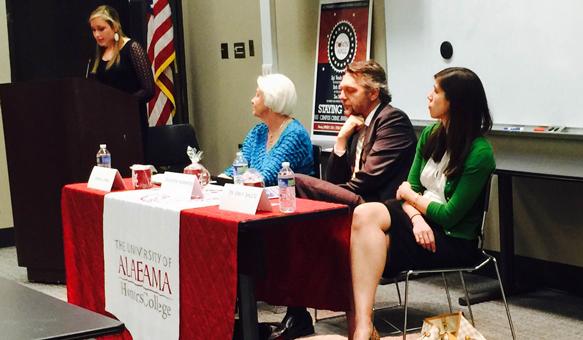This week’s topic for The University of Alabama’s Honors College’s town hall meeting was “Making the Grade: Reforming Alabama’s Education,” a discussion about the main challenges in Alabama’s school system.
Panelist Peter Hlebowitsh, dean of The University of Alabama College of Education, said he believed one of the major issues for Alabama’s schools was reading.
“The pathway to school success is reading,” he said.
Hlebowitsh said he believes students at the University should question what impact they can make and what they can do as a college to improve the reading scores in the state of Alabama.
“If our college can get in there and improve the reading in Alabama, we can get past one huge challenge that our Alabama school systems are currently facing,” he said.
Hlebowitsh said 80 percent of incarcerated individuals are high school dropouts, many of whom are illiterate. He said he believes that if literacy improves in Alabama, this can even impact the state’s incarceration and drop-out rates.
The second speaker, Shelley Jones, chairman of the Tuscaloosa City Board of Education, said she believes there are many major issues facing the Alabama school system, including the use of textbooks over technology and implementing a curriculum that meets the needs of increasing population.
“The biggest issue to me is the image public education today has from society,” Jones said. “We need to have more community involvement or something in order to change that horrible image.”
Emily Schultz, executive director of the Alabama Coalition for Public Charter Schools, spoke about the new charter schools the state of Alabama will implement by Fall 2016.
“Before taking charter schools into legislation, we went back into prior experience the other 42 states with charter schools went through in order to make this charter school in Alabama the best experience and opportunity for the children in Alabama,” she said.
Although Schultz said she believes bringing charter schools into Alabama is taking a risk, she said it is a risk worth taking.
“We tried to be really thoughtful and learned from past states’ experiences in order to make these charter schools the best we can make them be,” she said.
Hlebowitsh said he sees both the positive and the negatives that charter schools in Alabama may bring.
“The promise of having charter schools in Alabama is the fact that charter schools look at new innovative ways to educate kids,” he said. “One negative I see, though, is the fact that Alabama is allowing uncertified teachers to teach at these charter schools that will be opened next year.”
He said he disagrees with this aspect of the new charter school initiative.
“Some states that have charter schools require that the teachers are certified, but in Alabama that will not be the case. Alabama should have registered teachers,” he said.
All three speakers said the charter school idea is risky, but is something that can benefit the state of Alabama’s education system.
“If you don’t take charge of change, change will take charge of you,” Jones said. “We must do something different in order to make that change we want to see.”







